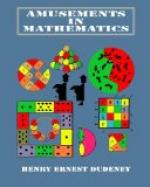14.—Square money.
“This is queer,” said McCrank to his friend. “Twopence added to twopence is fourpence, and twopence multiplied by twopence is also fourpence.” Of course, he was wrong in thinking you can multiply money by money. The multiplier must be regarded as an abstract number. It is true that two feet multiplied by two feet will make four square feet. Similarly, two pence multiplied by two pence will produce four square pence! And it will perplex the reader to say what a “square penny” is. But we will assume for the purposes of our puzzle that twopence multiplied by twopence is fourpence. Now, what two amounts of money will produce the next smallest possible result, the same in both cases, when added or multiplied in this manner? The two amounts need not be alike, but they must be those that can be paid in current coins of the realm.
15.—Pocket money.
What is the largest sum of money—all in current silver coins and no four-shilling piece—that I could have in my pocket without being able to give change for a half-sovereign?
16.—The millionaire’s perplexity.
Mr. Morgan G. Bloomgarten, the millionaire, known in the States as the Clam King, had, for his sins, more money than he knew what to do with. It bored him. So he determined to persecute some of his poor but happy friends with it. They had never done him any harm, but he resolved to inoculate them with the “source of all evil.” He therefore proposed to distribute a million dollars among them and watch them go rapidly to the bad. But he was a man of strange fancies and superstitions, and it was an inviolable rule with him never to make a gift that was not either one dollar or some power of seven—such as 7, 49, 343, 2,401, which numbers of dollars are produced by simply multiplying sevens together. Another rule of his was that he would never give more than six persons exactly the same sum. Now, how was he to distribute the 1,000,000 dollars? You may distribute the money among as many people as you like, under the conditions given.
17.—The puzzling money-boxes.
Four brothers—named John, William, Charles, and Thomas—had each a money-box. The boxes were all given to them on the same day, and they at once put what money they had into them; only, as the boxes were not very large, they first changed the money into as few coins as possible. After they had done this, they told one another how much money they had saved, and it was found that if John had had 2s. more in his box than at present, if William had had 2s. less, if Charles had had twice as much, and if Thomas had had half as much, they would all have had exactly the same amount.
Now, when I add that all four boxes together contained 45s., and that there were only six coins in all in them, it becomes an entertaining puzzle to discover just what coins were in each box.




